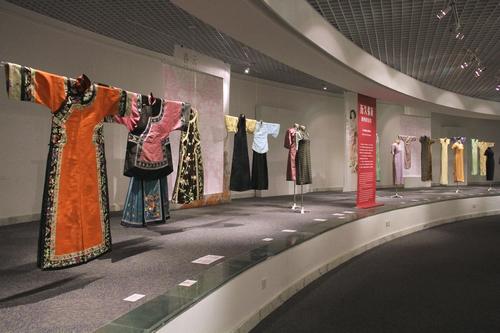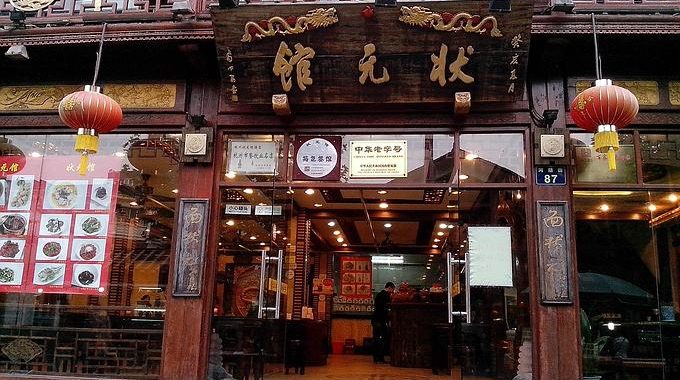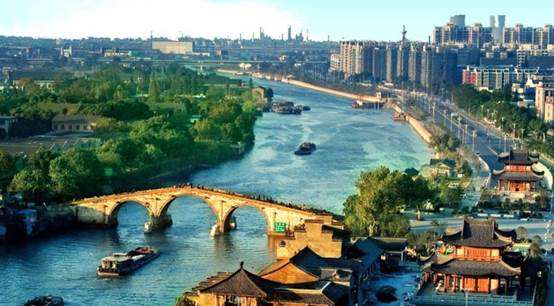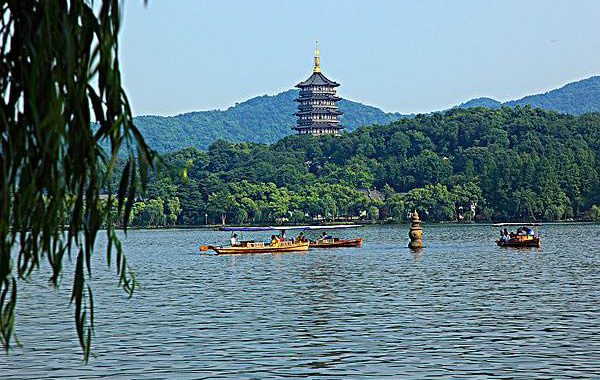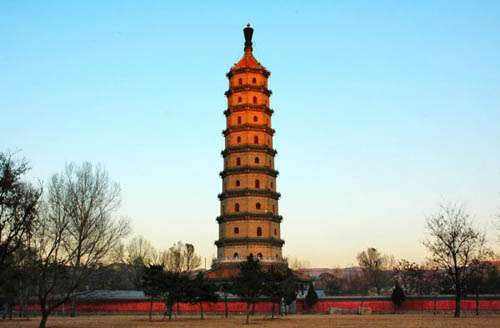Open Sesame
13 min readJack and his merry band of web-makers were becoming like the legendary characters Ali Baba and the 40 Thieves from the Arabian tale in A Thousand and One Nights. Indeed, Jack Ma loved the idea of the magic “Open Sesame”code from that desert tale. Soon after opening, capital investments to the tune of 25 million USD began pouring into the little net start-up faster than one could say “Open Sesame”.
Quickly, the platform began taking Chinese SMEs mainstream with e-commerce ventures such as Taobao Marketplace, Alipay, AliMama, and more, bringing in Yahoo! co-founder Jerry Yang as an investor along with a whopping one billion USD in jection.

Alibaba. com staff at a company event
By 2014, as the company was about to take its IPO on the New York Stock Exchanges and go supernova as NYSE: BABA, they had nearly 100 million users in over 20 countrieswith global online transactions exceeding one trillion RMB. Shattering all investment records with its IPO of 25 billion USD in September, the company continued to move at a mercurial pace-perhaps one of the fastest in the world, with ventures into entertainment, cinema, sports, and beyond.
Alibaba Group staff celebrate the company’s ten year anniversary in 2013
The company’s stated 2020 goals are to exceed 912 billion USD in annual revenues, but that’s all part of the plan. It’s well known that Jack Ma, that little boy running around West Lake, wants the company to last to the year 2101 so that he can say that his legacy has spanned three centuries. At this rate, it just might.
The buzzing beehive campus sprawls out like a fortress of glass, steel, and landscaped happiness-with a touch of Zen gardening. Nestled amidst the Xixi wetlands region of Hangzhou are the main facilities for the juggernaut that is the e-commerce empire of Alibaba.
This architecture embodies the sort of sci-fi like vision of work and nature that Jack Ma emphasizes as a CEO and philanthropist: harmony of both natural and economic ecosystems with Hangzhou characteristics. With at least eight(and perhaps more in the future) interconnected buildings, this vortex of China’s e-commerce revolution houses some of the country’s finest young minds.
The campus’s residents-most in their late 20s-have ID badges that mirror the curious mindset of the Alibaba worker:a novel name. All employees here must take on a character name from one of the novels from Hong Kong writer Louis Leung-Yang Cha, popularly known as Jin Yong.A founder of the Ming Pao newspaper in 1959, Jin Yong’s novels focus on the Chinese genre of martial arts and chivalry, called wuxia. Given that the limited number of characters and the turnover rate, the names on their badges can be comical, such as Lin Pingzhi 40187-Lin being a character from the novel The Smiling and Proud Wanderer,40187 being the number they are in the company hiring order.
Alibaba Group’s Binjiang campus
Regardless of whether they are new hires or old hats, they are eligible for the company’s unique marriage lottery. Every May, Jack Ma marries employees in massive wedding ceremonies. At their peak, Jack married almost 700 at a time, but it’s only around
102 couples these days-adding to the company mythology that its legacy will last three centuries.
Jack Ma on Hangzhou
Iwas born in Hangzhou,I grew up in Hangzhou,studied in Hangzhou,and worked in Hangzhou.I started businesses in Hangzhou,my home is in Hangzhou,my colleagues are in Hangzhou,and my dreams are in Hangzhou.Hangzhou gives me sustenance.“Hangzhou Guy”is practically written on my face.This life of mine is in Hangzhou.
Hangzhou is a magical place.The scenery is exquisite.But Hangzhou folks are nicknamed”Iron Heads”.We Hangzhou guys are very stubborn.
Ilike Hangzhou.What other city can compare with it?There is West Lake,there are tea houses.We even have our own card game.
When I was small,I was taught English by Chinese teachers.I felt like that wasn’t working, so where could I find myself a teacher?I thought foreigners would be the best English teachers. Starting from age 12 or 13,I hung around at the entrance of the Shangri-La Hotel on Beishan Road by West Lake every day to meet foreigners, offering myself as their tour guide with the goal of learning English.
In nine years’ time,I’d gone around every inch of West Lake, and I learned English really well.
Another place I often went to as a child was the Hangzhou tea house, along with my father. We listened to storytelling, to Suzhou-style ballads, to the masters telling of the Three Kingdoms and General Yue Fei. You can say I was steeped in the tea house as I grew up.
Many of the major decisions concerning Alibaba were made in a tea house. The annual West Lake Summits were a sudden inspiration while sitting inside a tea house. It was also inside a tea house by West Lake that we decided to create Taobao. com.
I am rarely unhappy, but sometimes my heart is confused. When this happens,I occasionally take a walk at Yongfu Temple close to the Lingyin Temple. When I first started my business,I’d also frequently go to places like Baoshi Hill, Baopu Daoist Temple or the Longjing tea plantations. We also didn’t neglect the many disco clubs and bars in Hangzhou. Once,I took 200 people disco-dancing.
Alibaba is now bringing in more and more employees from overseas.I hope to be able to integrate them into China, into Hangzhou, and into the company. So whenever they visit the Hangzhou headquarters, we take them for a weekend crawl around Hangzhou’s bars.
Hangzhou has something else that exists nowhere else in the world, and that’s a card game called “Three Against One.”Nobody outside Hangzhou knows how to play it. It’s a Hangzhou specialty.
Hangzhou is the Eden of Alibaba. To have been able to develop here is Alibaba’s privilege. Without Hangzhou, there is no Alibaba.
Alibaba is a”rare flower”. This rare flower drew benefits from the soil of private enterprise. In 2003, the Zhejiang Provincial Party Committee proposed policies that boosted the development of small and medium-size enterprises. The target of Alibaba’s services is those tens of thousands of small businesses. Our mission is to provide a platform so that no business is too difficult to do. Without a sound economic base of private enterprise, there is no meaning to Alibaba’s existence. Thus, it’s the city that made Alibaba.
I’ ve been to many cities around the world, and I think that the city most similar to Hangzhou is Seattle, USA. The city of Seattle is not large and the scenery is lovely. Who would have thought that it was the birthplace of Microsoft, Boeing, Starbucks, and many other outstanding enterprises?I think Hangzhou is becoming more and more like Seattle.
Alibaba’s Daniel Draper is in no way related to the Don Draper of Mad Men fame,but the two share one thing in common:starring in legendary business roles in heady historical times.Australian Daniel Draper joined Alibaba in 2000,when he was just 22 and fresh out of Mandarin study at Zhe jiang University.Back then,China had yet to join the World Trade Organization and Alibaba was just a year-old operation.Daniel has been there for Alibaba’s meteoric rise and has done so in a variety of roles,from the”Safety and Trust Team”to his current duties handling the public face of the international divisions.
WHAT MAKES ALIBABA A DYNAMIC PLACE TO WORK?
I’ve actually been at Alibaba pretty much since the beginning,having joined the company in early 2000.I’ve seen it grow from a small start-up with a big dream to being the leading player in many areas.From the initial start as a B2B trade listings site in 1999,through to growing China’s dominant e-commerce platforms and online payments, through to innovative fintech, online entertainment, automobiles, sports, and an ever
-growing list of others.
WHAT’S IS LIKE TO WORK WITHJACK MA?
It has been an honor and privilege to work with a guy who has built up these companies that have changed so many aspects of life in China, not just e-commerce, but also payments and philanthropy.
WHERE DO YOU LIKE TO GO TO UNWIND IN HANGZHOU?
I guess my best spot for relaxing would be picnicking down by Xiang Hu with my family or in one of the areas around the tea fields in the hills to the west of West Lake. The latter is pretty good, as it has fresh air, scenery, and places for hiking-well, at least the local version with lots of steps-as well as small restaurants and tea houses.
All in the Family
Akey division for Alibaba is Europe, where another fresh-faced graduate, Fedor Deichmann, was tapped by senior Alibaba brass to step up business operations. Basedin Berlin, he enjoys flying back to Hangzhou for corporate communion and relaxing by West Lake.
HOW DID YOU GET INVOLVED WITH ALIBABA AND WHAT EXCITES YOU ABOUT WORKING FOR THEM?
I have been very interested in China, its history, language, and culture since the beginning of my college years. After I graduated,I spent a year studying Chinese in Taiwan, and was lucky to find Alibaba right when I finished my studies.I joined the company in early 2014, as one of the first foreigners to spearhead our international business development initiatives for Tmall(Alibaba’s B2C platform). It’s been immensely exciting to be part of a company that is so influential both in the global tech world and in Chinese history as a whole. At Alibaba, we are reinventing the way e-commerce is done through our ecosystem philosophy. At the same time, we are also a significant stimulant in Chinese macroeconomic consumption, thereby directly contributing to China’s economic transition from investment to consumption.
HOW IS INTEREST MOUNTING IN EUROPE ABOUT ALIBABA? WHAT SORT OF QUESTIONS ARE EUROPEANS RAISING ABOUT IT?
Since we went public, Alibaba has become a world famous company, and for some international companies, even seen as the only way to enter the Chinese market. Likewise, European companies, with their many high-quality products that are high in demand in China, see Alibaba as a gateway to entering the Chinese market. Therefore, more often thannot, our discussions with our many interested potential partners in Europe are not aboutwhether to enter the Chinese market through Alibaba, but how and when to do so. They will often raise questions about the market potential of their products, the costs involved of setting up a storefront operation through our platform, and the kind of marketing services that we can provide to help them amplify their branding. So overall,I would say the reaction from our European clients is very positive, and we as the European Embassy team are working hard to help make this path to China as smooth and efficient as possible.
WHAT WOULD YOUR ADVICE BE TO PEOPLE WHO WANT TO WORK FOR ALIBABA?
One of our key values is to “embrace change”.I would tell anyone interested in working for Alibaba to be as open-minded and flexible as possible.E-commerce is a very fast moving industry where rules and regulations sometimes change overnight. The only way to be successful in such an environment is by accepting the changes around you and challenging the routine.
West End Boys
Canadian Network
As leaders of a gaggle of young entrepreneurs from Canada, Alex Gale and Lucas Porter-Bakker have networked Hangzhou like no other wholly-owned company ever has.
“We were looking around China a few years ago for the perfect city to open a training center. It had to offer a good work and life balance as we planned to live and do business for years to come. Hangzhou fits the bill,”says Lucas Porter-Bakker, an affable Toronto native.
In 2013, Lucas led a team of ten young Canadians to launch Westgroup, an investment and training center company in Hangzhou.”After a year of registration procedures, we finally got our license and approved name and opened our first English training centre. We do basic business English and have several excellent Hangzhou government clients, including over 4,000 from the airport who are training to welcome guests for the G20,”
says Lucas, Westgroup’s managing director.
“”This is a smaller city to operate in compared to Shanghai or Beijing, but with lots of greenery, West Lake, and cultural heritage…I wind down here by riding my bike or hikin g,”says Alex, who serves as a senior manager and is a founding partner.
Staying focused is of paramount importance to this young group as Hangzhou expandsand demand for their English training services spikes.”We’ re now seeing investment incubators in Hangzhou thanks to Alibaba and creative and tech startups emerging. Way more companies are moving in, real-estate is picking up, and more people around China want to relocate here. Nature does play a part in why people want to come work here, and Hangzhou is seeking to preserve its heritage spots. This is going to mean more business for us as we are the only training centers of English totally owned and run by native speaker s,”explains Lucas.
In early 2016, Westgroup launched an app called “Goji”after the local Chinese berry popular in teas.”This app allows Chinese university students to send voice messages toCanadian and North American students to practice their English,”says Lucas.”The app is a good example of the training and tech opportunities in Hangzhou. It takes work but it’s well worth it and we are here for the long run.”
From Trade to Tourism Said Abolsaed and Faraned Rasmy Emad of Egypt
Egyptians Said Abollsaed and Faraned Rasmy Emad stroll along the northern banks of West Lake with bright smiles. The sunshine is out on a late spring morning, and thousands of tourists amble along the walkways under the verdant canopy.
“Today is a beautiful day and it inspires me. With all of these people, some are going to get hungry and I want to open an Egyptian restaurant here for them,”says Said with a big grin. His friend and business partner Faraned smiles and concurs,”Hangzhou will be very good to open a business for Egyptian food.”
The two partners are already established traders in the nearby Yiwu City, which is famous for its large contingency of foreigners from the Middle East. Like many traders in Yiwu they have partner offices in Hangzhou and view the city as a booming international destination.
“I like to come to Hangzhou to relax and enjoy nature. Most of my days in Yiwu are spent at the office. But here there are quite a lot of tourist places that can be drawn on the world’s map to go to,”Said commented.”We could easily run more and more trading businesses here, and we plan to expand into tourism services, not just for Chinese but for tourists from all over the world who come here. In Egypt we have the Pyramids and the Nile. China has the Great Wall and Grand Canal here too in Hangzhou.”Rolling in the
Dough
Dominique Savio Muhire’s Hangzhou Bakery
France’s Dominique Savio Muhire rolls out some of Hangzhou’s finest pastries from his very own La Semencerie Bakery. His Hangzhou success story is as sweet as the handmade chocolates and cakes he creates with imagination and passion.
How did you come to Hangzhou and set up a bakery business?
Itook on an accounting internship which brought me to Hangzhou by chance. While working as an intern,I began to study Mandarin and gained a love for the Chinese culture.
When my internship ended my love for China continued on, so I took a job teaching French at the Alliance Francaise. After a few years of teaching, the vision for a bakery started to appear in my mind. This dream caused me to return to France and train as a professional baker and pastry chef at the Ecole Francaise de Boulangerie et de Ptisserie d’ Aurillac.
After I graduated from pastry school,I came back to Hangzhou and got offered a job at the French restaurant, Le Provence, as a bartender. This gave me time to further develop my business plan.
What has made Hangzhou a fun place for you to do business?
It excites me to do business in Hangzhou. My intuition led me to fall in love with Chinese culture. This feeling paired with an economic boom lends opportunity. It thrills me to see young entrepreneurs embracing these elements and starting up their own businesses.
Do you have any advice for foreigners who want to do business in Hangzhou?
I think one of the most important elements to doing business in China is having an awareness and understanding of Chinese culture. Before beginning business ventures, an adaptability is essential in order for things to move along smoothly.
Plugged In
Don Munro CEO& Founder of Efergy
Technologies
Hailing from Manchester, United Kingdom, Don Munro is a plugged-in guy-as one might suspect from the CEO and founder of Efergy,a company that manufactures energymonitoring products for the global market place. Getting in on Hangzhou’s boom early gave his business the head start it needed.
What encouraged you to set up Efergy in Hangzhou?
Actually the main reason we set up Efergy in Hangzhou is that it’s in a perfect location, with easy access to ma jor manufacturing cities but also a beautiful environmentto live in.I also met my business partner here. He was working on a UN project and spotted a gap in the market to supply an electronic display that would allow households to monitor their electricity use instantaneously. So if you put on your washing machine you could see immediately how much it was costing you.
How do you view Hangzhou as a city for foreign entrepreneurs?
It’s no coincidence that Hangzhou won the Forbes Magazine ‘ Best Cities forCommerce Award’ for many years. It’s also won the National Award for China’s Happiest City consecutively for 11 years. It’s a great technology hub, with the beautiful West Lake in the middle of the city and tea mountains 15 minutes away.
What is your near and long-term view for Hangzhou as a creative and IT hub?
Hangzhou has always been a beautiful place for people to work and relax. However, now the local government is investing in building an infrastructure to take the city forward in the future. This is enticing a lot of new exciting tech companies here. If we take the Binjiang area of the city as an example, when I first arrived it was nearly all fields, now we have offices for companies such as Alibaba, Netease, Bosch, Nokia-Siemens, Huawei, ZTE.
A new stadium and exhibition center have just been completed. The city is also in the middle of building a world-class metro system that is easing congestion at peak periods.



